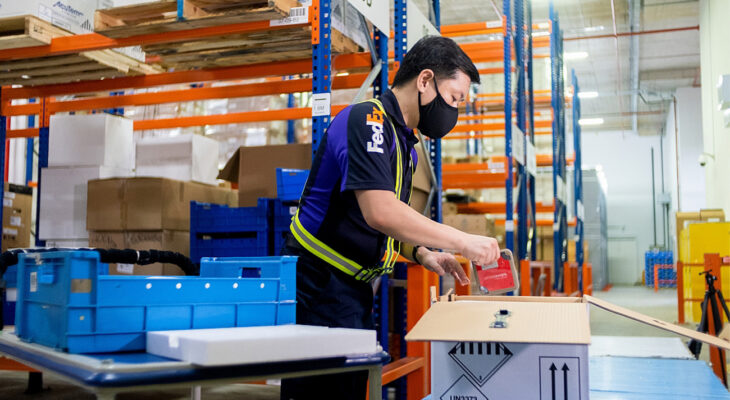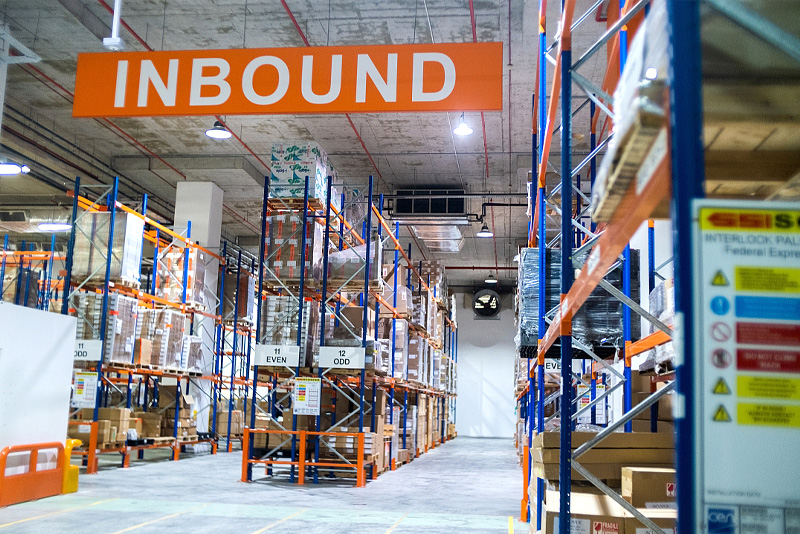
Keeping Supply Chains Running
Logistics providers like FedEx have played a key role in facilitating global commerce during the pandemic.
With supply chains severely disrupted last year, the important role of logistics services providers in delivering essential goods around the world was put in the spotlight following the global outbreak of the Covid-19 pandemic.
With the recent arrival of vaccines, these companies are now playing a critical role in transporting, storing, and distributing the vaccines to ensure that the people who need them most can be vaccinated as quickly as possible. As a leading industry player, FedEx has been a key player amid these seismic shifts in the global logistics sector.

BiZQ speaks to Audrey Cheong, Managing Director of FedEx Singapore, on the impact of the pandemic on global supply chains and the firm’s role in transporting vaccines around the world.
How has the COVID-19 pandemic affected global supply chains?
The global pandemic of COVID-19 has upended the global logistics sector with adjustments to operations, supply chains, regulations, and manpower. However, it also revealed the critical role of the logistics industry – particularly supply chains – in keeping packages and essential medical aid moving. It has transformed the way we keep logistics flowing, with lasting impact on the future of the sector.
This year’s growth for the logistics sector is now projected to be down by more than 10 to 15 per cent compared to the pre-COVID-19 period, although it is estimated that the Asia Pacific region will perform relatively stronger with the largest market size forecast. The new normal will see diverse sourcing under decentralised supply chains and will benefit markets like India, Malaysia, Taiwan, Vietnam, and Thailand.
This will change the movement patterns of goods and create a need for diversification of trade routes to reduce dependence on one country or one production location. There has been a strategic shift in supply chain management from “just in time” delivery to “just in case” inventory building. This model favors the increased use of slower, more economical delivery solutions. To accommodate this, we offer a portfolio of services and delivery options tailored to different shipping needs, including express or deferred shipping.
Currently, with vaccine shipping, logistics providers require teams of healthcare experts who understand the complexity that comes with the intent of transporting vaccines across continents. A reliable global supply chain that can transport vaccine doses from laboratory to the end user with efficiency and speed will be crucial.
FedEx, as an essential business, is one of the few companies with a global network and capabilities to keep critical supply chains moving during this unprecedented time. We continue to deliver, as applicable regulations allow, despite local restrictions in various parts of the world.
How do you see Singapore playing a pivotal role in the supply chain of COVID-19 vaccines for the ASEAN region and beyond?
As COVID-19 vaccines are essential in our fight against the pandemic, our network capabilities provide us with the expertise and capacity to deliver COVID-19 vaccines safely across the Asia Pacific region. We are actively engaged with manufacturers, distributors and authorities, and our global network stands ready to move vaccines as and when they are approved.
With two major cold chain facilities serving the region, Singapore is well-equipped to meet multiple distribution needs – with the FedEx South Pacific Hub (ALPS) and Life Sciences Express Hub (LSEH).
On one hand, the ALPS facility manages inbound and outbound deliveries, including cold chain needs, along with FedEx’s freight capabilities. For healthcare shipments in the inbound and outbound processes, we use packages with built-in cooling elements transported via a regular cargo container, or a C-Safe container – essentially a battery-powered refrigerator that allows us to control and moderate the temperature of cold chain items.
On the other hand, LSEH can facilitate large-scale warehousing and domestic/ international distribution for vaccine manufacturers and healthcare customers and/or end users. These include supporting vaccine manufacturers with supplemental temperature-controlled warehousing (due to anticipated increase in production stock). The facility also offers customised temperature warehousing capabilities, comprising cold rooms and freezers to hold vaccines at different temperature ranges. It also supports packaging and cooling elements so that vaccines can be shipped at the specific temperatures required.
We have the capacity to facilitate on-demand distribution within Singapore or internationally – to any destination within the FedEx network of 220 countries and territories.

What are the key challenges of shipping, transporting, storing and distributing COVID-19 vaccines?
Temperature control and real-time tracking are two key aspects that will ensure successful end-to-end shipping. There are and will be different vaccines available, each with its own unique cold chain requirements, so there is no ‘one-size-fits-all’ approach. The Pfizer-BioNTech COVID-19 vaccine, for example, is one that specifically requires temperature-controlled shipping to be as low as -70 degrees Celsius. Other vaccines may also have different temperature requirements too – with Moderna’s vaccine needing to be shipped at -20 degree Celsius and AstraZeneca’s vaccine needing to be kept at 2-8 degree Celsius.
Both origins and destinations would need to be Dangerous Goods-certified to handle pickups and deliveries of dry ice. We will also consider the destinations, transit times, regulatory requirements, and special operating plans for each country – something that we have been doing for a long time and have built a network to support shipping of clinical, pharmaceuticals and other healthcare shipments including vaccines.
Additionally, there is a high risk of spoilage if vaccines fall outside of the prescribed ranges for even a brief period of time. A study by the World Health Organization (WHO) estimates that up to 50% of vaccines are wasted globally each year, largely due to lack of temperature control and the logistics to support an unbroken cold chain. This makes it necessary for the origins and destinations to be Dangerous Goods-certified to handle pickups and deliveries of dry ice.
Flexibility is also critical as the situation remains fluid, and we have shown this throughout the pandemic. We have been quick to invest in digital technology to boost our network and supplement our temperature-control solutions in our cold chain with real-time tracking capabilities.
What are some digitalised features of the Life Sciences Express Hub and how have these helped in strengthening the company’s core capabilities?
The FedEx Life Sciences Centre (LSEH) can facilitate large-scale warehousing and domestic and international distribution for vaccine manufacturers, healthcare customers and even end users. We offer different services to meet different needs and circumstances.
Our temperature-controlled warehousing consists of cold rooms and freezers to hold vaccines at different temperature ranges, along with various packaging and cooling elements, so that vaccines can be shipped at the specific temperatures required.
To facilitate transit with technology, we also have C-Safe containers that allows us to control and moderate the temperature of cold chain items. We are prepared for any delays and are equipped with ultra-low temperature freezers and refrigerated temporary storage rooms.
Our operations rely on FedEx innovations and solutions such as the Priority Alert First Overnight services that tracks vaccine shipments as they move across our network.
We also have SenseAware, our in-package monitoring device for shipments. This device has multiple sensors to record vital signs based on six key variables – temperature, location, light exposure, humidity, shock and barometric pressure for monitoring and analysis.

















